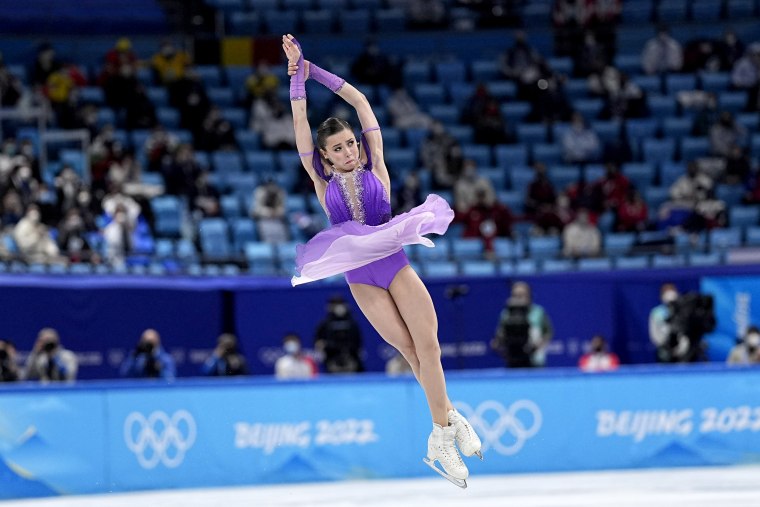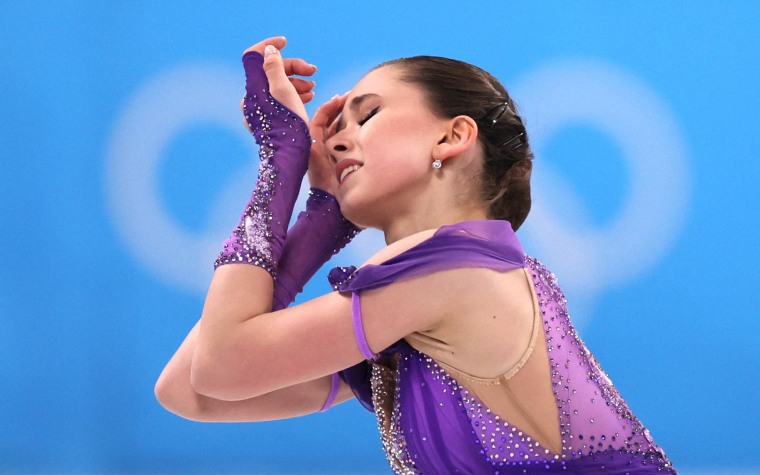Russian figure skater Kamila Valieva returned to the ice Tuesday in pursuit of her second gold medal at the Beijing Winter Olympics, but still shadowed by the doping saga that could cost her both.
Valieva, 15, finished the day with the lead in the women's individual event as she began her bid for victory after sport’s top court ruled she could continue to compete despite having tested positive for a banned substance before the Games.
Before the positive test was reported last week, the Russian prodigy was the clear favorite to win individual gold after helping lead her team to victory last week. But comments by Valieva, who was briefly suspended from competition before being reinstated, suggest the scrutiny has taken its toll. Other athletes and analysts, meanwhile, were dismayed that she was allowed to skate again.
On the ice Tuesday Valieva made a mistake on landing a triple axel early in her short routine, but recovered well and glided across the ice to Kirill Richter's "In Memoriam" before burying her face in her hands as tears came to her eyes at the end of the routine.
Her score of 82.16 points was enough to propel her into first place ahead of the free skate portion of the individual event on Thursday.

In her first public comments since the case came to light, Valieva told Channel One Russia on Monday that she was “happy” but “emotionally tired” after the Court of Arbitration for Sport (CAS) cleared her to skate even though she tested positive late last year for trimetazidine, a heart medication that is banned for athletes.
An Olympic official told reporters Monday that according to Valieva, her positive test was the result of a mix-up with her grandfather’s medication.
“Her argument was [that] this contamination happened with a product her grandfather was taking,” said Denis Oswald, permanent chair of the International Olympic Committee’s Disciplinary Commission.
Oswald also confirmed Valieva's entourage would be investigated.
“You can imagine a girl of 15 would not do something wrong alone,” he said.
The result of Valieva’s Dec. 25 drug test only emerged last week, after she helped lead her Russian teammates to gold in the figure skating team event.
She and her teammates — 2021 world champion Anna Shcherbakova and last year’s world bronze medalist, Alexandra Trusova — are now hoping to sweep the medals in the individual event in an Olympic first. On Tuesday, Valieva and Shcherbakova ranked first and second, with Trusova in fourth after Japanese skater Kaori Sakamoto.
In its decision, CAS said Valieva would be allowed to continue at the Beijing Games in part because as a minor she is a “protected person” subject to different rules than adults. It also cited the delay in reporting the test result and the risk of causing Valieva “irreparable harm” by preventing her from competing.
But the medal ceremony for the team event has been postponed, and the International Olympic Committee (IOC) says it will also hold off on other ceremonies involving Valieva until the doping allegation is resolved.

The decision to allow Valieva to skate has prompted criticism from athletes and officials around the world.
As the Russian star left the Capital Indoor Stadium ice and was putting on her warmup jacket on Tuesday, NBC figure skating analyst Tara Lipinski lamented that the Russian’s performance was even allowed to happen.
“She had a positive test, we should have not seen this skate,” said Lipinski, the 1998 Olympic gold medalist. “I don’t know how many times over the last year I have said that she is the best figure skater I’ve ever seen. And just saying that now, not only makes me confused, but it makes me angry and again, disoriented, by everything that I thought that I knew.”
Yuna Kim, the 2010 Olympic figure skating champion, also added her voice to the mix.
An "athlete who violates doping cannot compete in the game. This principle must be observed without exception," she said in an Instagram post Monday. "All players’ efforts and dreams are equally precious."
Sha’Carri Richardson, an American sprinter who couldn’t run in the Tokyo Olympics because of a positive marijuana test, tweeted Monday asking for an explanation of the difference between Valieva’s case and her own.
“The only difference I see is I’m a black young lady,” she said on Twitter.
The United States Olympic and Paralympic Committee also criticized the CAS decision on Monday, saying it was denying athletes the right “to know they are competing on a level playing field.”
With Russia barred from international sports competitions from December 2020 through the end of this year due to a previous doping scandal, its athletes are competing under the banner of the Russian Olympic Committee.
NBC News has requested comment from the court.